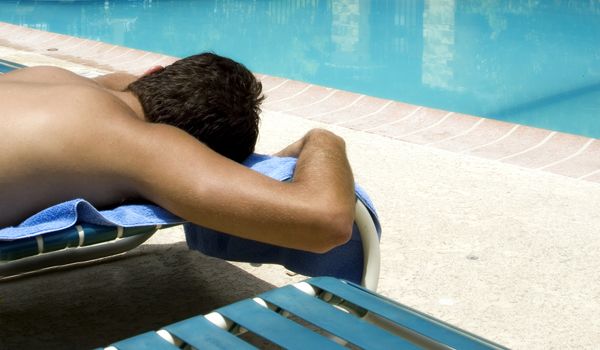Fake Tan Products May Help Women Cut Back on Tanning Beds

Spray on self-tanning lotions and other sunless tanning products may help women cut back on their use of tanning beds, a new study says.
Among women in the study who used sunless tanning products, close to 40 percent said they had decreased their use of tanning beds, and about 37 percent said they had decreased the amount of time they spent tanning in the sun. Tanning that involves exposure to ultraviolet (UV) rays (as is the case with tanning in the sun or a bed) can increase the risk of skin cancer.
The findings are encouraging, and suggest sunless tanning products have the potential to decrease harmful tanning behaviors among women, said study researcher Dr. Suephy Chen, a dermatologist at Emory University School of Medicine in Atlanta.
Some experts have argued against the promotion of sunless tanning products, saying it further feeds the perception that the "tanned" look is desirable. But it's very hard to break away from such ideas, Chen said, so sunless tanning products may be a practical solution. Indeed, more than 90 percent of women surveyed said they thought tanned skin was more attractive than skin that is not tanned.
However, Chen said sunless tanning products may need to be improved to gain wider acceptance. Some participants in the study complained the products left streaks on their skin, or produced an undesirable color. "There's a lot of potential there to make these products better," Chen said.
Replace the tanning bed
Chen and colleagues surveyed 415 women living on the Emory University campus or in the surrounding area. The participants' average age was 28, and about half were involved in sororities.
Sign up for the Live Science daily newsletter now
Get the world’s most fascinating discoveries delivered straight to your inbox.
About 70 percent of women said they had tanned in the sun at least once in the past year, 26 percent said they had used a tanning bed, and 48 percent said they had used sunless tanning products.
Women who had used sunless tanning products at least five times in the past year were about three times more likely to have cut back on tanning in the sun, and about twice as likely to have cut back on tanning in beds compared with those who used sunless tanning products less often, according to the study.
Users of sunless tanning products were more likely to have a lighter skin complexion, believe that tan skin is more attractive, and to have had skin cancer in the past, compared with women who did not use these products.
Because the study was small and involved a high percentage of students in sororities, the findings may not be generalizable to the population as a whole, Chen noted.
Sunless tanning products are safe and do not increase the risk of skin cancer, Chen said.
Better tanners
The finding is "really great news," said Dr. Doris Day, a dermatologist at Lenox Hill Hospital in New York, who was not involved in the study. "Women have been slowly adapting to the idea of using a sunless tanner," to at least partially replace getting a tan through exposure to UV rays, Day said.
Day said sunless tanners have improved in recent years, and the low cost of some tanners sold in drugstores makes these products accessible to women.
But there is still a lot of work to be done to reduce unhealthy tanning behaviors, Day said, considering more than 1 million women in the U.S. go to tanning salons every day. Sunless tanning products, in conjunction with messages about the harms of UV exposure, might reduce the use of tanning beds and tanning in the sun, she said.
The study is published online today (Dec. 19) in the journal Archives of Dermatology.
Pass it on: Women who use sunless tanning products decrease their use of tanning beds and other harmful tanning behaviors.
Follow MyHealthNewsDaily staff writer Rachael Rettner on Twitter @RachaelRettner. Find us on Facebook.

Rachael is a Live Science contributor, and was a former channel editor and senior writer for Live Science between 2010 and 2022. She has a master's degree in journalism from New York University's Science, Health and Environmental Reporting Program. She also holds a B.S. in molecular biology and an M.S. in biology from the University of California, San Diego. Her work has appeared in Scienceline, The Washington Post and Scientific American.











